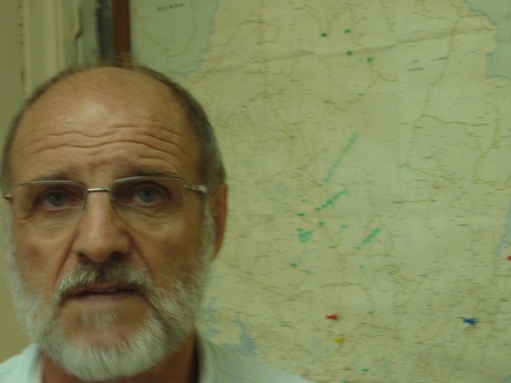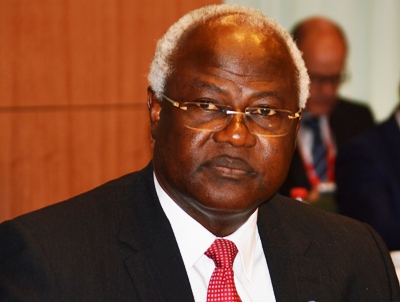 The head of mission, MSF, Sierra Leone,
Mr Walter Lorenzi, has said that MSF is unlikely to take over the
running of
the Kenema Ebola unit, as demanded this week by striking nurses in
Kenema. Mr
Lorenzi disclosed this during an exclusive interview with natinpasadvantage.
He said that MSF does not have the resources to
do this and they wanted other players including NGOs and the government
to
mobilize all the necessary resources to defeat the killer disease. He
disclosed
that MSF had a team in Kenema on Tuesday and Wednesday advising the
health
authorities about infection control measures in the wake of the high
profile
deaths of three nurses attached to the Kenema Ebola unit and the
equally
high-profile confirmation that Doctor Khan, the renowned head of the
unit, had
come down with the disease. Asked whether any MSF health workers in Sierra Leone had been infected with the
disease
he replied in the negative and added that in the whole period during
which MSF
has been combating the disease, starting with the initial outbreak in Zaire,
the
organization has only had one health worker who has contracted the
disease. He
maintained that rigorous discipline in following procedures was
required among
health workers to prevent infection. He added that to fight the disease
many of
the resources needed could be trained at short notice. He mentioned
contact
tracing, health information and burials as areas where resources were
needed
and could be trained and mobilized quickly by other contributors.
The head of mission, MSF, Sierra Leone,
Mr Walter Lorenzi, has said that MSF is unlikely to take over the
running of
the Kenema Ebola unit, as demanded this week by striking nurses in
Kenema. Mr
Lorenzi disclosed this during an exclusive interview with natinpasadvantage.
He said that MSF does not have the resources to
do this and they wanted other players including NGOs and the government
to
mobilize all the necessary resources to defeat the killer disease. He
disclosed
that MSF had a team in Kenema on Tuesday and Wednesday advising the
health
authorities about infection control measures in the wake of the high
profile
deaths of three nurses attached to the Kenema Ebola unit and the
equally
high-profile confirmation that Doctor Khan, the renowned head of the
unit, had
come down with the disease. Asked whether any MSF health workers in Sierra Leone had been infected with the
disease
he replied in the negative and added that in the whole period during
which MSF
has been combating the disease, starting with the initial outbreak in Zaire,
the
organization has only had one health worker who has contracted the
disease. He
maintained that rigorous discipline in following procedures was
required among
health workers to prevent infection. He added that to fight the disease
many of
the resources needed could be trained at short notice. He mentioned
contact
tracing, health information and burials as areas where resources were
needed
and could be trained and mobilized quickly by other contributors.
Mr Lorenzi said this
was a new
disease for West Africa, and it was
important
to avoid criticism; his organization’s role was to be part of the
decision-making process and share experience and expertise. A
comprehensive
team would be needed to overcome Ebola, including nurses,
epidemiologists,
information specialists, psychologists and social workers. MSF could
not do it
all; more actors were needed. He opined that screening at checkpoints
could
contribute to reduce transmission.
Apparently acutely
aware of the
sensitivity of his position Mr Lorenzi, who declined to be recorded in
video or audio (editor's note: We
reproduce the independent reports of the two interviewers, based on
their hand-written notes), was at great pains not to
criticize any
of the other players in the Ebola struggle. When asked why the
neighbouring republic of Guinea
appeared to be more successful in combating the disease than Sierra Leone
he
replied that that would require careful analysis of all the various
socio
economic and other factors. When pressed on this he replied that he was
Italian and felt free to state his dislike of Berlusconi, but his
interviewers were Sierra Leonean and could express their opinions at
the next Sierra Leone elections. When asked about a recent apparent
difference of
opinion between MSF and WHO (MSF had declared the disease ‘out of
control’ and a
high-level visitor from the WHO, the assistant Director-General, made a
point
of assuring President Koroma shortly after that this was not their
view) he
maintained that this was merely a question of semantics and not a
serious
issue. When asked about internet reports that the US Department of
Defense is
heavily involved in the Kenema Ebola lab, researching aspects of
biological
warfare, he replied that the Americans and the US
embassy would be the best people
to put that question to. Throughout the 45 minute interview Mr Lorenzi
was at
pains to stress that the best approach at this point in the battle
against
Ebola was to have everyone united and focused on defeating the disease
rather
than pointing fingers and looking for people to blame.
Despite his modesty
and caution, the grim facts in a week of turmoil in Sierra Leone
reveal that MSF is at
the forefront in the fight against Ebola. The terrifying spread of the
disease
in Sierra Leone
in just the last few weeks justifies the earlier MSF assertion that
Ebola was
out of control. The call by the nurses for MSF to take over the
management of
the Kenema Ebola facility speaks volumes about the government nurses’
confidence in their own health authorities. An ailing Dr Khan was taken
to the
MSF field facility in Kailahun rather than being treated at the
government
Ebola facility collocated with the Kenema government hospital. This
Kenema
Ebola facility itself had been a source of controversy from the start
of the
outbreak, with patients from Kailahun, the source of the outbreak in Sierra Leone,
being
taken to Kenema rather than being treated in their district, close to
their homes.
MSF, on the hand, set up their Ebola treatment center in the field in
Kailahun.
What seems likely now, given the turmoil at the Kenema hospital, is
that at
least some of the infection that subsequently spread into Kenema
district and
thence to the rest of Sierra Leone, originated
from the Kenema facility.
The aweful, shocking
conclusion
from this is that the people, literate and illiterate, who refuse to go
to
hospital when they fall ill, who are intensely suspicious of medical
treatment,
have at least some small basis for their fears: in this outbreak, as in
others where
infection control is poor, you may be more likely to catch disease in a
hospital than outside it. The infection of government health workers
provides
additional ammunition for those already intensely suspicious of the
government’s efforts to control the outbreak.

Meanwhile a
despondent President
Koroma was shown on national television complaining to another
high-level
visitor from the WHO (this time the Africa
regional director) that his health workers were being infected and
assistance
was needed from the WHO. His tourism minister was, around the same
time,
castigating journalists for reporting Ebola and scaring away visitors.
Interview
with Walter Lorenzi, Chef de Mission, MSF-SL
by
Michel Smith
The Medecins Sans
Frontiere (MSF) has attributed the acceleration in the spread of the
Ebola virus to a number of factors, among which are:
(a)
The density of the population in the affected areas.
(b)
The traditional beliefs of the people in the affected areas, which make
early detection of cases difficult as it is at times impossible to
change people's set beliefs.
(c)
Infrastructural development, such as the construction of roads, which
provide unimpeded and easy movement of people.
(d)
The proximity of towns and villages in the densely populated areas.
(e)
Indadequate contact tracing methods.
(f)
The strength of the response of the government to the outbreak.
(g)
Inadequate resources to fight against the outbreak.
The disease, we have
been told, is spread by a virus, as is the case with HIV/AIDS.
Reinforcing the bodies of victims greatly enhances the chances of
survival as it helps fortify the immune system in its fight against the
virus. The method being applied by the MSF in the Kailahun district to
build the resistance of potential victims is to provide adequate
nutrition and constant rehydration.
The head of the MSF
in Sierra Leone, Walter Lorenzi, in an interview revealed that the
greatest obstacle against the fight to curtail the spread of the
disease is contact tracing, and supports government's establishment of
checkpoints in high-risk areas to check and determine the movemnet of
people. He dismissed the widespread reports that the MSF team sent
initially to respond to the outbreak in the Kailahun district was
attacked by some members of the public, and blamed the media for
propagating rumours. Since MSF's taking over the fight agains the
disease in the Kailahun district the situation has stabilised there.
The acquisition of a mobile laboratory from the World Health
Organisation (WHO), he explained, has made their verification of
potential victims faster and easier, compared to the initial phase,
where blood samples had to be sent to Kenema for verification. To stop
the chain of transmission MSF has set up pre-referral units, where
suspected cases are screened.
On the way forward,
Lorenzi stressed that the fight would be made much easier by
intensifying public education and welcomed the introduction of the
Ebola task force management team set up by government to offer a rapid
response to the threat. The task force comprises experts from diverse
fields such as doctors, nurses and other medical staff, social welfare
workers, psychologists, etc. He stressed that public enlightenment is
the key to succeed in fighting Ebola.
On the issue of
taking over the running of the Kenema Ebola center as requested by the
health workers in Kenema, Lorenzi explained that with the resources at
its disposal, MSF does not envisage taking over the Kenema center.
 The head of mission, MSF,
The head of mission, MSF, 